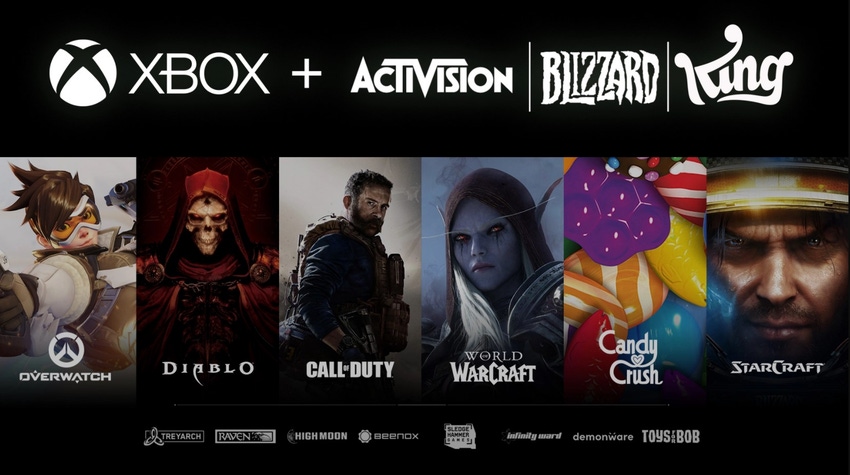Gamers will face higher prices, fewer choices and less innovation if Microsoft's $69 billion acquisition of Activision is allowed to go through, says the CMA.
February 10, 2023

Gamers will face higher prices, fewer choices and less innovation if Microsoft’s $69 billion acquisition of Activision is allowed to go through, says the CMA.
This is the provisional conclusion of the in-depth investigation carried out by the Competition and Markets Authority (CMA). The deal has been on the UK M&A watchdog’s radar since last July, and in September it decided a closer look was needed.
What it boils down to is that Microsoft already enjoys a strong position in the cloud gaming and console markets thanks to various assets including its Windows OS, Xbox console range, and Xbox Cloud Gaming Service.
By letting it acquire the publisher of some of the most popular titles in gaming – including the likes of Call of Duty (CoD), Overwatch, Warcraft and Candy Crush, among others – Microsoft will have the means and incentive to make those titles available exclusively on its own gaming platforms, making it much harder for rivals like PlayStation maker Sony and to some extent Nintendo to attract customers to their products and services.
Even if Microsoft didn’t make Activision’s games outright exclusives, it could still hurt its rivals by delaying their release on PlayStation, for example.
“Our job is to make sure that UK gamers are not caught in the crossfire of global deals that, over time, could damage competition and result in higher prices, fewer choices, or less innovation. We have provisionally found that this may be the case here,” said Martin Coleman, chair of the independent panel of experts that conducted the CMA investigation, in a statement on Wednesday.
Coleman said there are an estimated 45 million gamers in the UK, and that people in the UK spend more on gaming than they do on music, film, TV, and books. This group has benefited from strong competition between Xbox and PlayStation, he said, which have spent the last 20 years trying to outdo each other with new and innovative services.
Microsoft has bought games publishers in the past, of course.
Notable acquisitions include Halo developer Bungie in the year 2000. Bungie was sold again a few years later with Microsoft retaining the rights to the Halo franchise, which was folded into its in-house development studio 343 Industries. Microsoft made headlines again in 2014 when it bought Mojang, developer of wildly-popular sandbox game Minecraft. And in 2020, it paid $7.5 billion for Bethesda, which boasts titles like Fallout, Wolfenstein, and The Elder Scrolls in its portfolio.
However, as popular as those games are, none of them – with the exception of Halo perhaps – are on quite the same level as those on offer from Activision. Games like CoD in particular are frequently roped in to be launch titles to build excitement for upcoming new games consoles, for example.
The CMA plans to propose possible remedies that will address its concerns by 22 February. Interested parties have until the beginning of March to weigh in on these upcoming proposals, as well as the findings of its in-depth investigation.
The CMA plans to publish a final report by 26 April.
If it does recommend blocking the acquisition, it might be something of a blessing in disguise for Activision.
It is more than a year since Microsoft lodged its $68.7 billion bid for the company. Back then, the world was beginning to open up again after the height of the pandemic, but the tech sector had yet to realise what this meant in terms of peoples’ willingness or otherwise to conduct their entire lives at home and online, and so it continued to operate as if staying at home and remaining glued to a screen was the new normal.
It turns out though, people quite like going outside and interacting face-to-face, and this has forced big tech to make the appropriate adjustments, i.e. cutbacks and redundancies. For Microsoft, the 10,000 jobs it is shedding are reportedly hitting its gaming divisions Bethesda and 343 Industries particularly hard.
With that in mind, is now really the best time for Activision to throw its lot in with Microsoft? Will the next title in the Call of Duty franchise really benefit from being owned by a company that is in the midst of axing a load of game developers?
Get the latest news straight to your inbox. Register for the Telecoms.com newsletter here.
About the Author(s)
You May Also Like








.png?width=300&auto=webp&quality=80&disable=upscale)


_1.jpg?width=300&auto=webp&quality=80&disable=upscale)


.png?width=800&auto=webp&quality=80&disable=upscale)